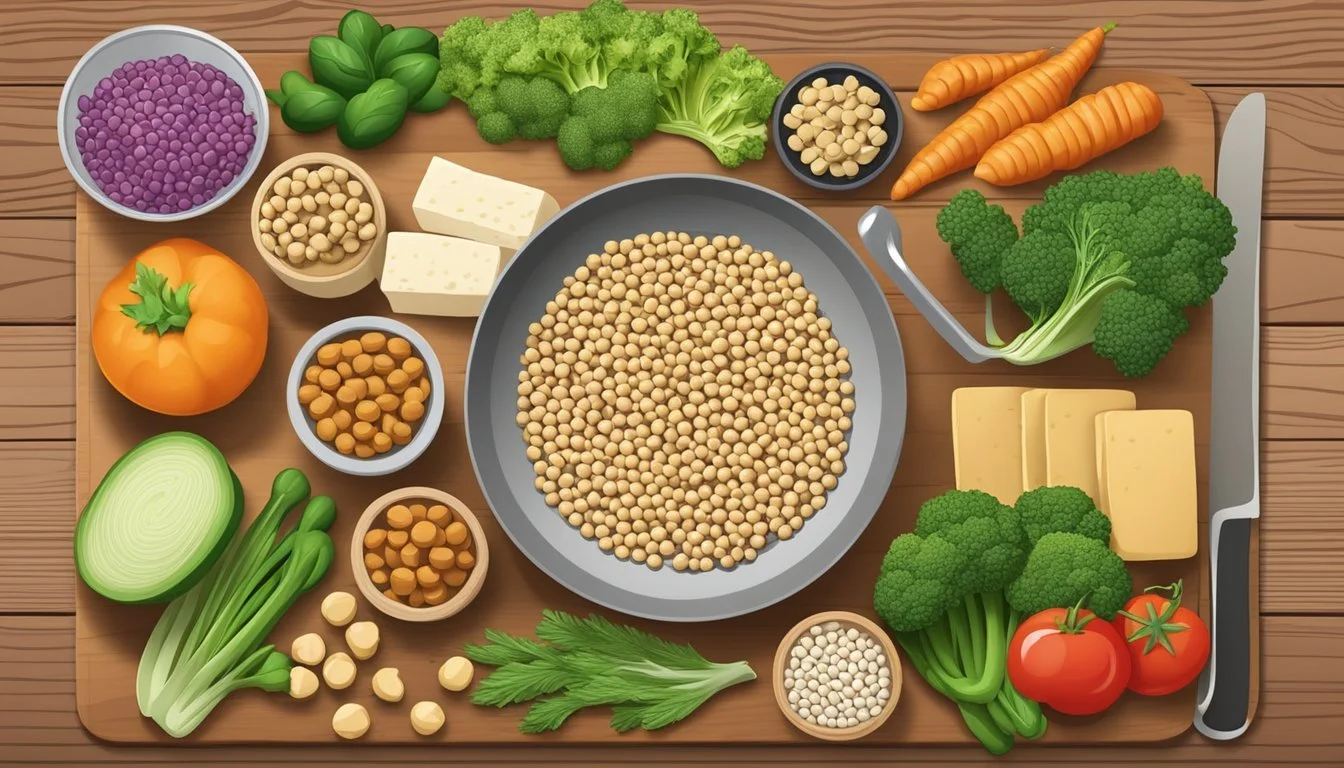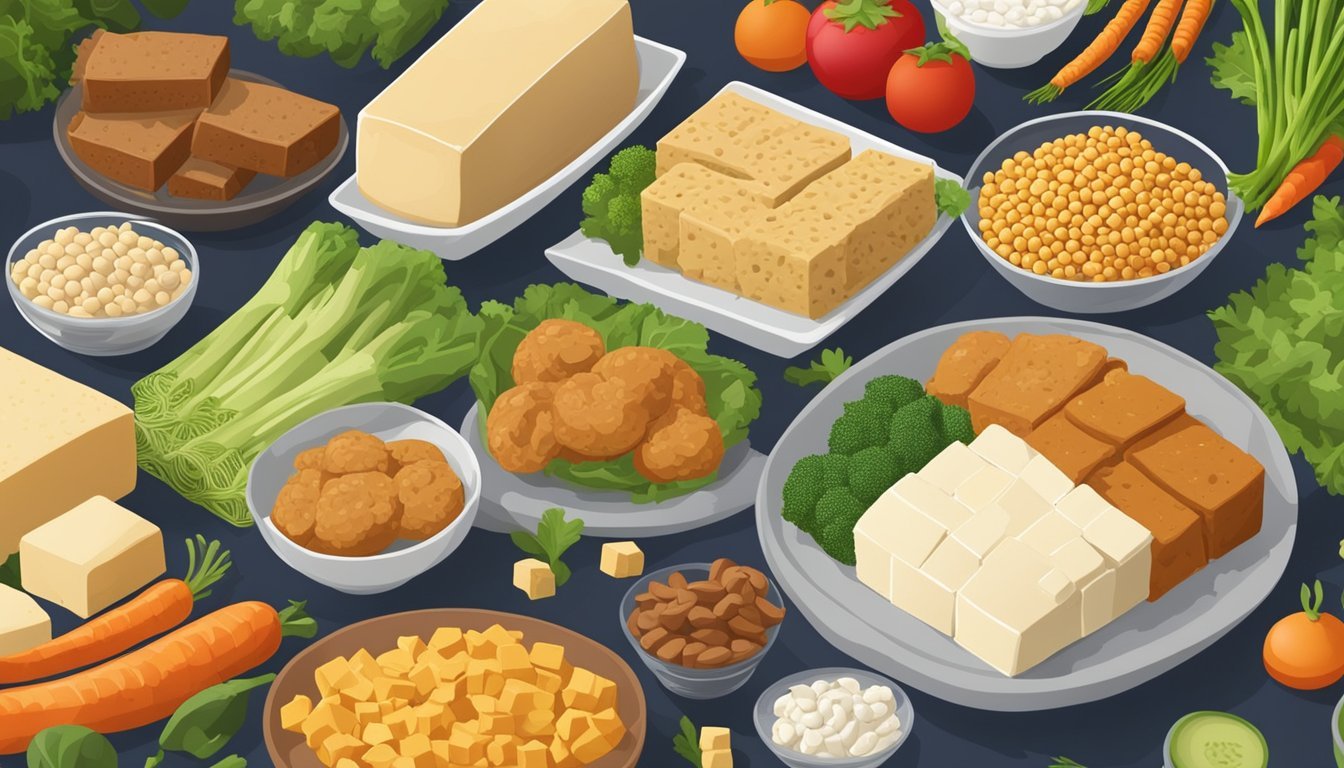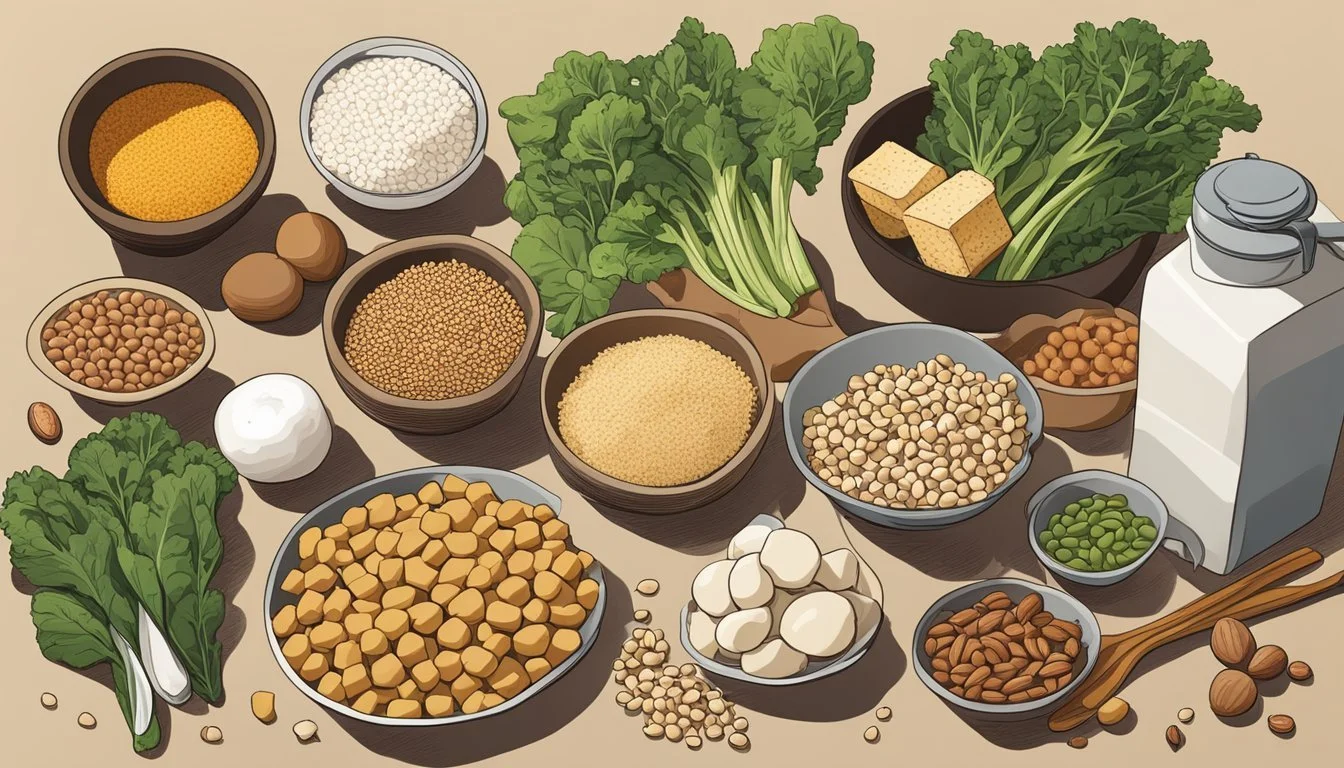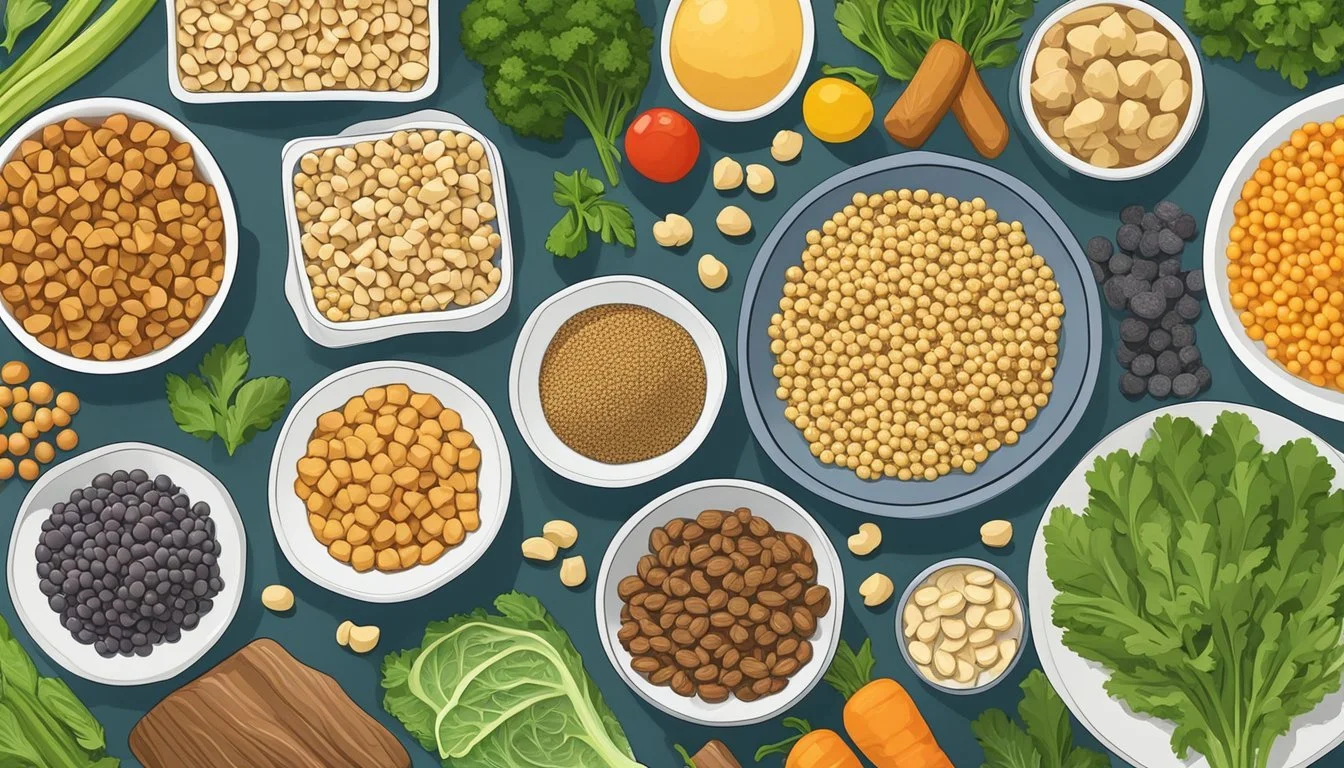Keto Diet: Vegetarian Protein Sources to Maintain Your Macros
Adopting a ketogenic diet typically involves a high intake of animal-based proteins, posing a challenge for vegetarians aiming to reap the same health benefits. The ketogenic diet, high in fats and low in carbohydrates, nudges the body into a state of ketosis, where it burns fat instead of carbohydrates for energy. The vegetarian keto diet emerges as a symbiosis of ethical dietary choices and the pursuit of health benefits attributed to ketosis, such as weight loss and improved metabolic profiles.
To sustain a vegetarian keto diet, one must carefully select protein sources that align with the low-carb criteria. Traditional vegetarian staples like legumes and grains often exceed the carbohydrate limits of keto, requiring individuals to seek alternative sources. Several plant-based proteins do fit within the framework, such as nuts, seeds, and certain dairy products for those who consume them. The nutritional strategy centers around meeting protein needs—typically around 50 grams per day for the average adult—without exceeding carbohydrate restrictions, thus maintaining the body's ketotic state.
Despite dietary constraints, a well-planned vegetarian keto diet can satisfy both nutritional requirements and ethical considerations. It taps into diverse protein sources such as eggs, cheese, and Greek yogurt for vegetarians who include dairy and eggs, and hemp seeds, almonds, and vegan protein powders for stricter adherents. Careful meal planning is intrinsic to the diet's success, ensuring a variety of nutrients are consumed and deficiencies avoided. With resourcefulness and commitment, practitioners find that a balanced vegetarian keto diet is not only possible but can also be a fulfilling way to meet health objectives.
Understanding Keto
The ketogenic, or keto, diet is a low-carb, high-fat diet that aims to induce a metabolic state known as ketosis. This section will explore the basic principles of ketosis, the potential health benefits of a vegetarian keto diet, and the challenges that vegetarians may face when attempting to adhere to keto dietary guidelines.
Basics of Ketosis
Ketosis is a metabolic state in which the body switches from using carbohydrates as its primary source of energy to burning fat. This change occurs when carbohydrate intake is significantly reduced, typically to less than 50 grams per day. The liver then produces ketones, which are used as an alternative energy source for various organs, especially the brain. Achieving ketosis necessitates a disciplined approach to eating, ensuring that one's diet is both low in carbs and adequate in fats.
Benefits of a Vegetarian Keto Diet
A vegetarian keto diet combines the principles of ketosis with plant-based nutrition. It offers several unique health benefits:
Weight Management: By reducing carbohydrates, the body is encouraged to burn fat stores, potentially leading to weight loss.
Blood Sugar Control: A low-carb diet may help stabilize blood glucose levels, which can be beneficial for individuals managing diabetes.
Heart Health: Some studies suggest that a higher intake of healthy fats and lower consumption of processed carbs can improve cardiovascular health.
However, it is crucial to note that individual experiences can vary, and one should consult healthcare professionals before making significant dietary changes.
Challenges of Keto for Vegetarians
Adopting a vegetarian keto diet poses several challenges:
Protein Sources: Finding keto-friendly vegetarian proteins that are low in carbs can be difficult. Common sources like beans and legumes may have too many carbs, whereas options like soy and certain nuts can fit the keto criteria.
Nutritional Deficiencies: Without careful planning, one might risk deficiencies in nutrients typically abundant in animal products, such as Vitamin B12 or iron.
People following the vegetarian keto diet need to plan their meals meticulously to overcome these challenges, ensuring a varied intake of permissible foods to meet their nutritional needs without exceeding their carb limits.
Protein in a Keto Vegetarian Diet
In the context of a vegetarian keto diet, protein serves as a vital macronutrient that is necessary for maintaining muscle mass and facilitating metabolic processes, while adhering to low-carbohydrate restrictions.
Importance of Protein on Keto
Protein is crucial on a ketogenic diet because it provides essential amino acids that the body cannot synthesize on its own. These amino acids are necessary for a wide range of bodily functions, from repairing tissues to enzymatic reactions. For individuals following a vegetarian keto diet, sourcing protein becomes a task of finding options low in carbohydrates yet high in nutritional value. This balance ensures the body remains in a state of ketosis, whereby it utilizes fat for energy, rather than carbohydrates.
Calculating Your Protein Needs
The daily protein requirement for an average adult on a vegetarian ketogenic diet typically aligns with the standard dietary recommendation of about 0.8 grams per kilogram of body weight. However, those who are active or looking to build muscle may require more protein, possibly between 1.2 to 2.0 grams per kilogram of body weight. It's essential to calculate individual protein needs based on one's specific lifestyle, fitness goals, and health considerations.
To calculate your daily protein requirement on a vegetarian keto diet, consider the following steps:
Determine your ideal body weight in kilograms (if you are at a healthy weight, use your current weight).
Multiply this weight by the recommended protein intake (0.8 grams to 2.0 grams, based on activity level).
Adjust your intake to meet the low-carb criteria of the ketogenic diet, ensuring proper distribution throughout your meals.
For instance, a sedentary person weighing 68 kg (150 lbs) might aim for approximately 54 grams of protein per day (68 kg x 0.8 g/kg), while an active individual may need more. It's important to note that vegetarian sources of protein often come with some amount of carbohydrates, so meal planning should be strategic to maintain ketosis while meeting protein needs.
Vegetarian Protein Sources for Keto
For vegetarians following a ketogenic diet, finding low-carb, high-protein foods is crucial for maintaining ketosis. This section focuses on dairy and plant-based proteins that fit the keto macros.
Dairy-Based Proteins
Dairy products provide a convenient source of high-quality protein for vegetarians on a keto diet. Popular choices include:
Eggs: Two eggs contain approximately 14 grams of protein with a minimal 1 gram of carbs. Eggs are highly versatile and can be incorporated into various meals.
Cheese: Different types of cheese offer varying protein amounts. Cottage cheese (how long does cottage cheese last?), for instance, provides about 20 grams of protein per 6 ounces, coupled with 6 grams of carbs.
Plant-Based Proteins
For those preferring or requiring plant-based options, several high-protein, low-carb sources are available:
Seeds:
Hemp Seeds: With 9 grams of protein and 1 gram of net carbs per ounce, hemp seeds are a potent source of nutrients.
Chia Seeds: They are not only rich in omega-3 fatty acids but also provide protein along with fiber to support a keto diet.
Nuts and Nut Butter:
Almonds and almond butter are rich in protein and healthy fats, providing about 6 grams of protein and 3 grams of net carbs per serving for the nuts.
Legumes: While many legumes are high in net carbs, careful selection and portion control can make them suitable for a keto diet. For example, peanuts and peanut butter can fit into a keto plan when consumed in moderation.
Soy Products:
Tofu: Made from soybean curds, tofu is low in carbs yet high in protein, making it a key ingredient in many vegetarian keto recipes.
Tempeh: Fermented and made from soybeans, tempeh is a bit higher in carbs but still keto-friendly in controlled portions.
Protein Powder: Vegetarian keto followers can opt for low-carb protein powders such as pea protein or plant-based blends, facilitating convenient protein intake without meat.
Non-Protein Keto-Friendly Foods
In addition to protein sources, a balanced vegetarian keto diet includes a variety of other essential food groups. Fats for energy, low-carb vegetables for vitamins and minerals, and specific snacks and condiments for flavor enhancement are all crucial.
Fats for Fuel
Key to the ketogenic diet is the consumption of healthy fats which serve as the primary energy source in the absence of carbohydrates.
Coconut Oil: Rich in medium-chain triglycerides (MCTs), coconut oil is a valuable fat source that can help in ketone production.
Olive Oil: A heart-healthy fat, olive oil is perfect for salads and low-temperature cooking. It's packed with antioxidants and monounsaturated fats.
Avocado: Not only are avocados high in fat, but they also provide fiber and potassium.
Butter: Ideal for cooking and baking, butter can be included but should be from grass-fed sources when possible.
Individuals should integrate these fats into their meals regularly, but watch the portion sizes as they are calorie-dense.
Low-Carb Vegetables
Although protein is important, so are the vitamins and minerals from vegetables, especially those that are low in carbohydrates.
Leafy Greens: These include spinach, kale, and lettuce, which are high in nutrients and low in carbs.
Cruciferous Vegetables: Vegetables like broccoli and cauliflower (how long does cauliflower last?) provide fiber and are rich in vitamins.
Incorporating a variety of these options ensures adequate micronutrient intake while maintaining ketosis.
Keto Snacks and Condiments
Snacks and condiments can enhance the flavor of food and provide additional nutrients without compromising the carbohydrate restrictions of the diet.
Seeds and Nuts: Almonds, walnuts, flaxseeds, and chia seeds are nutrient-dense and keto-friendly in moderation.
Berries: Small portions of berries like raspberries and blackberries can be included due to their low net carb content.
Careful selection of these items will contribute to overall satisfaction and sustainability of the diet. It's important to note that while snacks are permissible, they should be consumed conscientiously to ensure they don't provide too many carbs or calories.
Meal Planning and Recipes
Successful adherence to a vegetarian keto diet hinges on careful meal planning and the deployment of recipes that harmonize high protein with low net carb intake. This section navigates through the creation of a balanced meal plan and provides a selection of easy-to-make keto vegetarian recipes.
Creating a Balanced Keto Vegetarian Meal Plan
To maintain a balanced vegetarian keto meal plan, individuals must ensure that they consume adequate protein while managing their net carb intake to stay in ketosis. A diversified protein source portfolio maximizes nutritional intake without compromising the diet's principles. Essential vegetarian keto proteins include tempeh, tofu, and eggs, and should be calculated to fit within the daily net carb limit, ideally below 20 to 50 grams, to encourage weight loss and other health benefits.
Here is an example of how to structure a daily meal plan:
Breakfast: Scrambled eggs with spinach and mushrooms, seasoned with herbs and cheese.
Lunch: Tofu stir-fry with a variety of low-carb vegetables like zucchini and bell peppers (What wine goes well with bell peppers?).
Dinner: Vegetable curry with tempeh served over cauliflower rice.
These meals integrate protein sources while minimizing net carb intake, thus aligning with the vegetarian keto diet objectives.
Easy-to-Make Keto Vegetarian Recipes
Individuals seeking satisfying vegetarian keto dishes can explore recipes, such as the Broccoli Cheese Soup, which can be prepared with vegetarian broth as a protein-rich and low-carb meal option. For those with a taste for international cuisine, change up the flavors with keto-friendly vegetarian versions of classic dishes like stuffed bell peppers (What wine goes well with stuffed bell peppers?), using cauliflower rice and cheese for filling.
Here's a quick recipe to get started:
Keto Vegetarian Stuffed Bell Peppers
Bell peppers: 4 large, halved and seeds removed
Cauliflower rice: 1 cup, sautéed
Shredded cheese: 1/2 cup
Cream cheese: 1/4 cup
Chopped walnuts: 1/4 cup (for added protein and texture)
Seasonings: Salt, pepper, garlic powder to taste
Preheat your oven to 375°F (190°C).
Mix the prepared cauliflower rice with cream cheese, half of the shredded cheese, walnuts, and seasonings.
Fill the bell pepper halves with the mixture and top with the remaining shredded cheese.
Bake for 20-25 minutes or until peppers are tender and cheese is golden.
This recipe not only sticks to the necessary macros but also ensures a fulfilling and flavorful experience. A vegetarian keto recipe like this, rich in protein and low in net carbs, helps to support the dietary goals while providing culinary variety.
Supplementation and Nutrition
In a vegetarian keto diet, it is crucial to address potential nutrient deficiencies and know which supplements can be beneficial. This section guides through the necessary steps to ensure a well-rounded nutritional intake.
Navigating Nutrient Deficiencies
Vegetarian keto dieters often face challenges in maintaining adequate levels of certain nutrients that are typically abundant in meat-based diets.
Vitamins: A varied keto vegetarian diet can provide most vitamins, though Vitamin B12 is predominantly found in animal products and may require supplementation.
Minerals: Critical minerals like Iron, Calcium, and Zinc can be less bioavailable from plant sources. Leafy greens, nuts, and seeds are good sources, but absorption can be hindered by the diet's low carb nature.
To ensure optimal health, individuals may need to incorporate fortified foods or supplements. Regular blood tests can help monitor nutrient levels and adjust dietary intake as necessary.
Keto Supplements for Vegetarians
Select supplements can support a vegetarian keto diet by providing nutrients that might be insufficient from food alone.
Omega-3 Fatty Acids: Flaxseeds, chia seeds, and walnuts are plant-based sources of omega-3. Algal oil supplements are an alternative to fish oil for vegetarians to ensure enough EPA and DHA.
Vitamin B12: A must-have supplement for vegetarians, as plant-based sources are scarce.
Iron: While available in plant foods like spinach, supplementing with Iron may be necessary, especially for women or individuals with higher requirements.
Calcium and Zinc: These are critical for bone health and metabolic functions. Supplements may be warranted if dietary intake is low.
Each supplement should be taken under professional guidance, considering factors like bioavailability and individual health conditions. Additionally, combining vitamin and mineral intake with sources of fat can enhance nutrient absorption.
Health Considerations and Risks
When adopting a vegetarian keto diet, individuals must be informed of potential health considerations and risks. Nutrient deficiencies, transitional symptoms like the keto flu, and long-term health impacts are areas of concern that require attention and management.
Keto Flu and How to Avoid It
The keto flu is a common experience when beginning a ketogenic diet, marked by symptoms such as fatigue, headaches, and irritability. These symptoms are often due to electrolyte imbalances as the body shifts from glucose to ketone bodies for energy. To avoid or mitigate the keto flu, individuals should:
Increase water intake to stay hydrated.
Consume sufficient electrolytes like sodium, potassium, and magnesium.
Gradually reduce carbohydrate intake rather than cutting carbs abruptly.
Ensure adequate intake of vegetarian protein sources to maintain muscle mass and overall health.
Long-Term Health Impacts
The long-term health effects of a vegetarian keto diet are still being studied, but there are potential risks and benefits to consider. While some studies suggest weight loss and improved blood sugar levels, which can positively affect type 2 diabetes management, concerns related to heart disease hinge on the types of fats consumed. Individuals should:
Emphasize heart-healthy fats from vegetarian sources, such as avocados, nuts, and seeds.
Monitor cholesterol levels, as a high intake of saturated fats could negatively affect heart health.
Regularly consult with healthcare providers to check for nutrient deficiencies and keep track of health markers.
By understanding and managing these risks, individuals can strive for a balanced approach to a vegetarian keto diet.






